Chile's election: A tale of two daughters
- Published
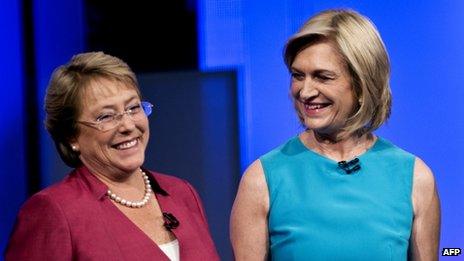
Michelle Bachelet (left) and Evelyn Matthei (right) grew up together
Chile held a presidential election on Sunday where both frontrunners were women - the socialist Michelle Bachelet and her right-wing rival Evelyn Matthei.
In a region where politics is still very much a man's game, that, in itself, is remarkable enough, but when one considers the relationship between the two women, it becomes more extraordinary still.
Ms Bachelet and Ms Matthei went to the same primary school and played together as kids.
Their fathers were close friends and served together in the Chilean air force until the military coup of 1973 tore them apart, with tragic consequences.
At times, the history of the two women and their fathers is like something out of a Latin American soap opera or a magical realist novel.
The region's great writers, Gabriel Garcia Marquez, say, or Isabel Allende, would struggle to invent such a plot.
Early ties
The story of Ms Bachelet and Ms Matthei starts in 1958 on a military base in the Atacama Desert in northern Chile. Their fathers, both air force officers, were posted there with their young families.
They lived on the same street - one at number 4 and the other across the road at number 13. Michelle Bachelet was seven years old and Evelyn Matthei five.
"To this day, Ms Bachelet's mother remembers how the two girls would play in the streets and go out on their bikes," says Rocio Montes, co-author of Daughters of Generals, a recently published book about the two women.
"They were living in a kind of ghetto. It was very remote. The air force families had their own food store, their own cinema, their own school. It was a very close community."
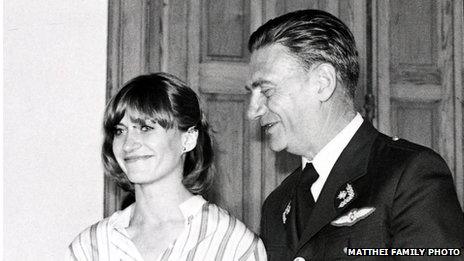
Evelyn Matthei (left) and her father Fernando (right) were friends of the Bachelets
The girls' fathers, Alberto Bachelet and Fernando Matthei, became good friends.
They shared a love of literature and music, and despite their political differences - Mr Bachelet was from the left, Mr Matthei from the right - they respected each other's views.
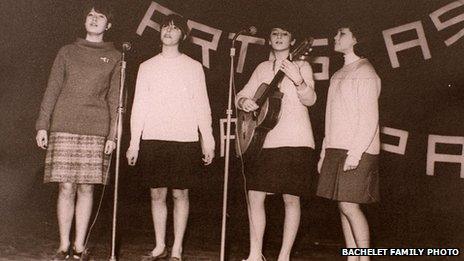
Michelle Bachelet (second from left) shares her father's love of music
When the two families moved to the capital, Santiago, in the 1960s, they stayed in touch.
But on 11 September 1973, everything changed.
The armed forces staged a violent coup, toppling the socialist government. The air force bombed the presidential palace.
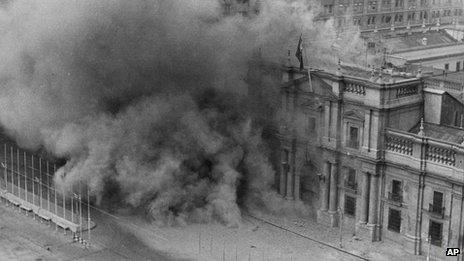
Military jets bombarded La Moneda palace during the coup led by Gen Pinochet
Mr Bachelet worked for the government at the time and was immediately arrested.
"I was detained in solitary confinement for 26 days," he later wrote to his son. "I was subjected to torture for 30 hours. They broke me inside.
"I've never known how to hate anyone. I've always thought that a human being is the most marvellous thing on earth, and should be respected as such. But I came across colleagues from the armed forces who I'd known for 20 years - students of mine - who treated me like a criminal or a dog."
Meanwhile, Mr Matthei was in London, working as a military attache.
He supported the coup, and shortly afterwards was recalled to Chile to take up a job as director of the Academy of Aerial Warfare in Santiago.
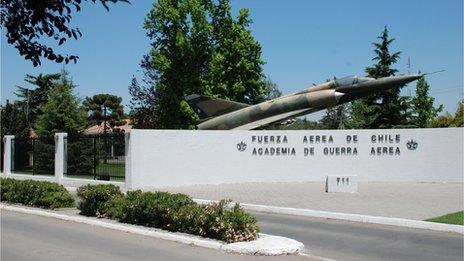
Mr Bachelet was tortured at the Academy of Aerial Warfare in Santiago
In December 1973, Mr Bachelet was arrested for a second time and taken to the academy. He was charged with treason and imprisoned in the basement, where he was tortured.
On 12 March, 1974, after a night of relentless interrogation, he died of a heart attack.
Moral issue
Just how much Mr Matthei knew of his friend's plight is unclear.
Although he was appointed as head of the academy in late 1973, he did not visit it until February 1974, and then only briefly.
He spent most of his time working elsewhere and was not in Chile on the day his friend died.
"He was nominally in charge of the academy but he didn't have authority over all of it," Ms Montes says. "He says he only once went to the basement."
"For Fernando Matthei, the death of Alberto Bachelet is a moral problem. He probably couldn't have done anything but, even so, he still has to live with the fact that he didn't try harder to save his friend, who was being tortured just a few metres below his office."
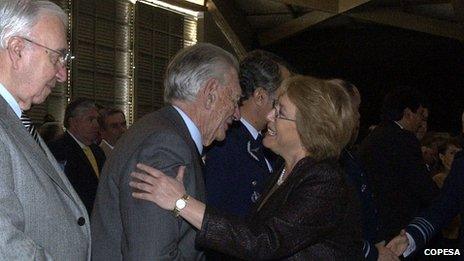
Ms Bachelet says she does not think Mr Matthei is to blame for her father's death
"It's a moral issue that pursues him to this day."
Some people in Chile say it is a criminal issue too, and have tried, without success, to bring Mr Matthei to trial for Mr Bachelet's death.
But even Ms Bachelet and her mother have said they do not regard Mr Matthei as guilty.
Contrasting fortunes
In the years after the coup, the two families suffered contrasting fortunes.
In 1975, Michelle Bachelet and her mother were detained in Villa Grimaldi, one of the military regime's most notorious torture centres, and then fled into exile in Australia and East Germany.
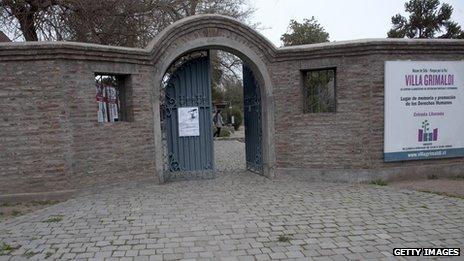
Ms Bachelet and her mother were held at Villa Grimaldi
Meanwhile, Mr Matthei rose through the ranks of the military to become the head of Gen Augusto Pinochet's air force and a member of the military junta.
By the 1990s, both Michelle Bachelet and Evelyn Matthei had entered politics and in 2006 Ms Bachelet became Chile's first female president.
Now, Michelle Bachelet is seeking to become the first Chilean president in more than half a century to serve a second term in office.
Symbol of friendship
These days, Ms Matthei lives in a house that used to belong to her father and which Mr Bachelet used to visit in the 1960s.
In the back yard, there are two olive trees - gifts from Mr Bachelet to Mr Matthei and symbols of a friendship that has formed an intriguing backdrop to the current election campaign.
"How is it that two girls who played together as kids are here, 50 years later, standing as presidential candidates on either side of the political fence?" asks Ms Montes.
"Is it to do with history or simply coincidence?
"Our conclusion is that it isn't just coincidence. It's a consequence of what happened to Chile in 1973," she told the BBC.
"The country was split in two, families were divided, friendships were broken.
"Chile is not yet fully reconciled with its past, and that's reflected in the lives of these two women who are standing for election and, in their different ways, were marked by the lives of their fathers."
- Published9 September 2013
- Published6 August 2013
- Published21 June 2012